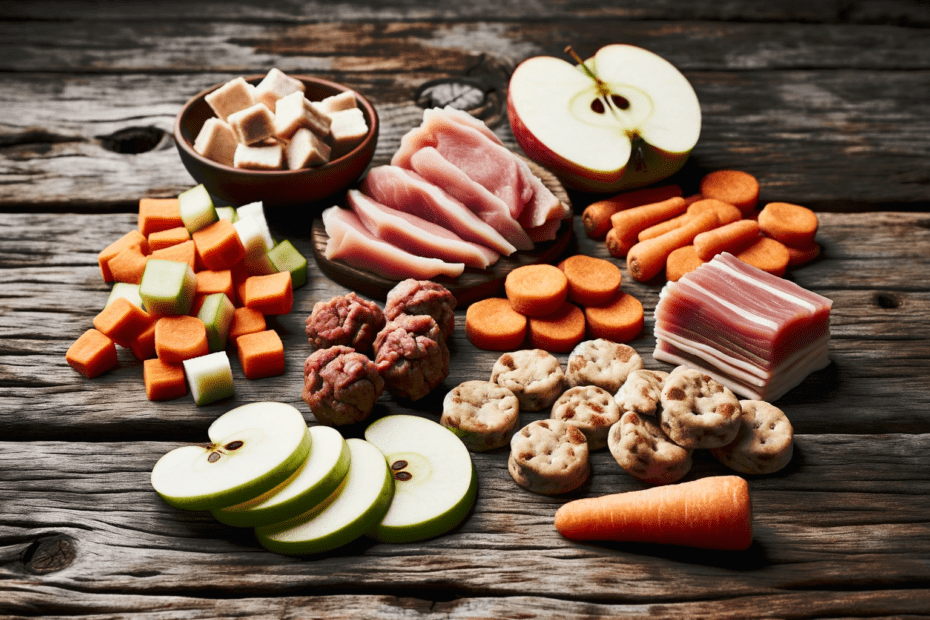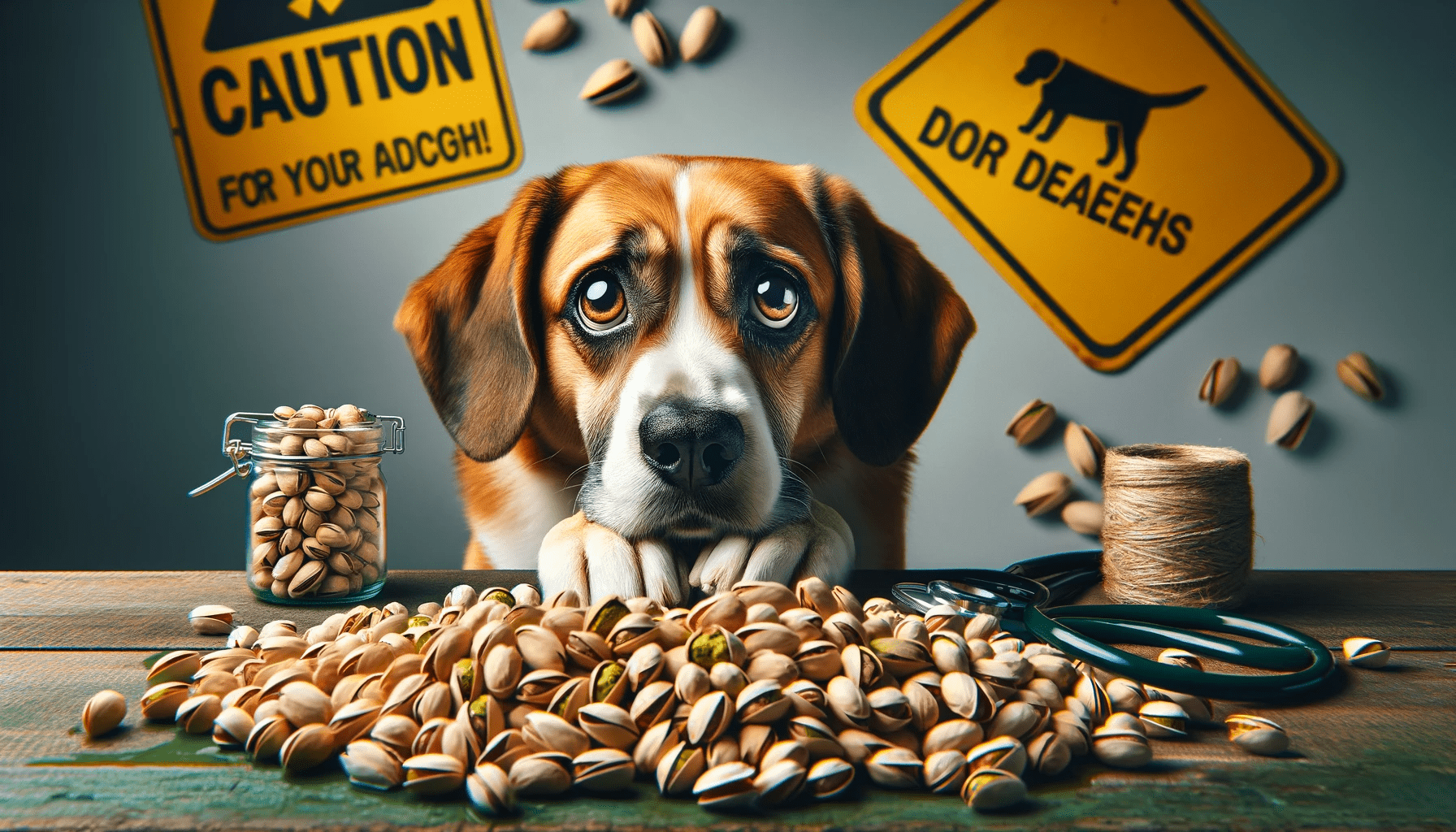Are you unsure about which dog treats are the best for your furry friend? Look no further!
In this article, we will answer all your burning questions about dog treat nutrition. Discover the key nutrients your dog needs, learn how to decode treat labels, and identify high-quality ingredients.
We will also help you avoid harmful additives and cater to your dog's specific dietary needs. Get ready to choose the best treats for training and ensure your pup's overall health!
Key Takeaways
- Providing a balanced diet for your dog's treats is important for their overall health and well-being.
- Homemade treats can ensure that your dog is getting the right nutrients, such as lean proteins and fruits and vegetables.
- Look for high-quality animal-based proteins like chicken, beef, or fish in dog treats to support tissue building and repair.
- Avoid harmful ingredients like chocolate, onions, excessive salt, sugar, and artificial additives in dog treats.
Understanding Dog Treat Nutrition
Are you unsure about what nutrients are important for your dog's treats? When it comes to dog treat nutrition, it's essential to understand the importance of providing your furry friend with a balanced diet.
Homemade treats can be a great way to ensure that your dog is getting the right nutrients, and there are plenty of dog treat recipes available that can help you create healthy and delicious treats for your pup.
When making homemade treats, it's crucial to include ingredients that are beneficial for your dog's overall health. For example, incorporating lean proteins like chicken or turkey can provide your dog with essential amino acids. Additionally, adding fruits and vegetables such as carrots or blueberries can offer vitamins, minerals, and antioxidants.
Another important aspect of dog treat nutrition is avoiding harmful ingredients. Certain ingredients, like chocolate or onions, can be toxic to dogs and should never be included in homemade treats. It's also advisable to limit the use of salt, sugar, and artificial additives, as these can have negative effects on your dog's health.
Key Nutrients for Dog Treats
To ensure your dog's treats provide the necessary nutrients, focus on incorporating key ingredients that support their overall health. When it comes to canine diet essentials, there are several key nutrients that should be present in your dog's treats.
Protein is an important nutrient that helps build and repair tissues, and it should be a primary ingredient in any nutrient-rich treat. Look for treats that contain high-quality animal-based proteins like chicken, beef, or fish.
Another essential nutrient for dogs is fat. Fat provides energy and helps with the absorption of certain vitamins. Opt for treats that contain healthy fats, such as those derived from sources like salmon or flaxseed.
Additionally, treats that are rich in fiber can aid in digestion and promote a healthy gut. Look for treats that include ingredients like sweet potatoes or pumpkin, which are excellent sources of fiber.
Incorporating vitamins and minerals into your dog's treats is also crucial. These nutrients play a vital role in maintaining your dog's overall health and well-being. Look for treats that contain ingredients like carrots, blueberries, or spinach, as these are packed with essential vitamins and minerals.
Decoding Dog Treat Labels
When decoding dog treat labels, you should look for a list of ingredients that includes high-quality sources of protein, fat, fiber, and essential vitamins and minerals. This will ensure that the treats are nutritionally balanced and provide the necessary nutrients for your dog's health. Understanding the ingredient list is crucial in making informed decisions about the treats you choose for your furry friend. Here are some key points to consider when decoding ingredient lists:
- Look for specific sources of protein: Ingredients like chicken, beef, or salmon provide high-quality protein that supports your dog's muscle development and overall health.
- Avoid fillers and by-products: Treats that contain ingredients like corn, wheat, and soy can be hard for dogs to digest and may not offer much nutritional value.
- Watch out for artificial additives: Treats with artificial colors, flavors, and preservatives can be harmful to your dog's health.
Understanding nutritional claims is also important when decoding dog treat labels. Look for claims like 'natural,' 'organic,' or 'grain-free' to ensure that the treats meet certain standards. However, it's essential to read the ingredient list to verify these claims and make sure they align with your dog's dietary needs.
Identifying High-Quality Ingredients
When it comes to identifying high-quality ingredients in dog treats, there are a few key points to keep in mind.
First, look for popular nutritious ingredients like real meat, fruits, and vegetables, as these provide essential nutrients for your dog.
Second, it's important to avoid harmful additives such as artificial colors, flavors, and preservatives, which can have negative effects on your dog's health.
Popular Nutritious Ingredients
Choose dog treats with high-quality, nutritious ingredients to ensure your pup receives the best nutrition. When it comes to popular nutritious ingredients for dog treats, there are several options to consider. Here are some healthy alternatives and homemade options that you can look for:
- Lean meats: Look for treats made with real, high-quality meats like chicken, turkey, or beef. These provide essential proteins and nutrients for your furry friend.
- Fruits and vegetables: Treats that include ingredients like sweet potatoes, blueberries, or carrots can offer vitamins, minerals, and antioxidants.
- Whole grains: Opt for treats that contain whole grains like oats or brown rice. These provide fiber and energy for your pup.
Avoiding Harmful Additives
To identify high-quality ingredients and avoid harmful additives in dog treats, prioritize options that use real, premium ingredients and steer clear of artificial fillers or preservatives.
When looking for dog treat alternatives, consider making homemade dog treats using wholesome ingredients. This way, you have full control over what goes into your furry friend's treats. Homemade dog treats can be made with ingredients like lean meats, whole grains, fruits, and vegetables.
Avoid using ingredients that are toxic to dogs, such as chocolate, onions, or garlic. Additionally, be cautious of using excessive amounts of salt or sugar in homemade dog treats.
Avoiding Harmful Additives and Fillers
To ensure the health and well-being of your furry friend, it's essential to be mindful of the additives and fillers found in dog treats. Some of these additives can be harmful to your dog's health, so it's important to know how to identify them and avoid them.
Here are some key points to keep in mind:
- Identifying safe preservatives:
- Look for natural preservatives like vitamin E (tocopherols) and vitamin C (ascorbic acid). These are safer alternatives to synthetic preservatives like BHA, BHT, and ethoxyquin, which have been linked to health issues in dogs.
- Avoid treats that contain artificial colors, as these can also be harmful to your dog's health.
- Common harmful additives:
- Avoid treats that contain ingredients like propylene glycol, which can be toxic to dogs.
- Steer clear of treats that contain excessive amounts of sugar or high-fructose corn syrup, as these can contribute to weight gain and other health problems.
- Fillers to avoid:
- Stay away from treats that contain fillers like corn, wheat, and soy, as these can be difficult for dogs to digest and may cause allergies or sensitivities.
Catering to Dog-Specific Dietary Needs
Now let's talk about catering to your dog's specific dietary needs.
Two important factors to consider are allergies and sensitivities, as some dogs may have adverse reactions to certain ingredients.
Additionally, different breeds may have specific dietary requirements that need to be addressed.
Allergies and Sensitivities
If your dog has allergies or sensitivities, it's important to cater to their specific dietary needs. Understanding their unique requirements can help you choose the right treats that won't trigger any adverse reactions. Here are some key points to consider:
- Identifying pet food allergies: Pay attention to any signs of allergies such as itching, diarrhea, or vomiting after consuming certain foods.
- Common sensitivities: Dogs can be sensitive to ingredients like grains, beef, chicken, dairy, or even certain fruits and vegetables.
- Reading labels: Look for treats specifically formulated for dogs with allergies or sensitivities. Check the ingredients list for potential triggers and avoid artificial additives.
Breed-Specific Dietary Requirements
When considering breed-specific dietary requirements, it's important to cater to your dog's unique nutritional needs based on their specific breed characteristics.
Different dog breeds have varying dietary restrictions and special dietary considerations that should be taken into account when choosing their food.
For example, large breed dogs may require a diet that promotes healthy bone and joint development, while small breed dogs may benefit from a diet that supports their high energy levels.
Additionally, certain breeds may have a predisposition to certain health conditions, such as allergies or sensitivities, which require specific dietary modifications.
It's crucial to consult with your veterinarian to ensure that your dog's diet meets their specific breed's requirements and promotes their overall health and well-being.
Choosing Treats for Training Purposes
To ensure successful training sessions with your dog, choose treats that have a high reward value and are easily consumed. The right treats will motivate your furry friend and keep them focused during training. Here are some tips to help you choose the best treats for training purposes:
- Variety of Flavors: Dogs, like humans, have preferences when it comes to taste. Experiment with different flavors such as chicken, beef, peanut butter, or cheese to keep your dog interested and engaged. Remember that not all dogs enjoy the same flavors, so it's important to find what your dog loves.
- Homemade Options: Making your own dog treats can be a great way to ensure the ingredients are healthy and tailored to your dog's needs. Homemade treats can also be a cost-effective alternative to store-bought options. Just be sure to avoid ingredients that are toxic to dogs, such as chocolate, onions, and garlic.
- Small and Bite-Sized: Training sessions involve multiple repetitions, so it's best to choose treats that can be quickly consumed. Small, bite-sized treats are ideal as they can be easily swallowed without interrupting the flow of training.
Ensuring Balanced Treats for Overall Health
Choose treats that provide balanced nutrition to support your dog's overall health and well-being. When it comes to ensuring balanced treats for your furry friend, you have the option of choosing between homemade and store-bought options.
Homemade treats can be a great way to control the ingredients and ensure your dog is getting the nutrients they need. You can find a variety of balanced treat recipes online that include wholesome ingredients like lean meats, fruits, and vegetables. By making treats at home, you have the flexibility to cater to your dog's specific dietary needs and preferences.
On the other hand, store-bought treats can also provide balanced nutrition if you choose the right ones. Look for treats that are made with high-quality ingredients and have a balanced ratio of proteins, fats, and carbohydrates. Avoid treats that are high in fillers, artificial preservatives, and added sugars. Reading the ingredient list and nutritional information can help you make an informed decision.
Regardless of whether you choose homemade or store-bought, it's important to remember that treats should only make up a small portion of your dog's overall diet. They should be given in moderation and as a supplement to their regular balanced meals.
Frequently Asked Questions
Can I Give My Dog Homemade Treats Instead of Store-Bought Ones?
You can definitely give your dog homemade treats instead of store-bought ones. Making homemade treats for dogs has several benefits, such as knowing exactly what ingredients are used and tailoring them to your dog's specific dietary needs.
Are There Any Specific Treats That Are Recommended for Puppies?
When it comes to puppy treat options, it's important to choose the best treats for your little one. Look for treats that are specifically made for puppies and provide the right balance of nutrition for their growing bodies.
Can I Give My Dog Treats if They Have Food Allergies or Sensitivities?
If your dog has food allergies or sensitivities, it's important to find dog treat alternatives that won't trigger a reaction. Common food allergies in dogs include beef, chicken, dairy, and grains. Consult with your vet for suitable options.
How Many Treats Should I Give My Dog in a Day?
You should consider dog treat portion sizes to ensure a balanced diet. Giving too many treats can lead to weight gain and health problems. Limiting treat intake has benefits for your dog's overall well-being.
Are There Any Treats That Can Help Improve My Dog's Dental Health?
Dental health treats, like dental chews, can help improve your dog's dental health. These treats provide benefits such as reducing plaque and tartar buildup, freshening breath, and promoting healthy gums.
Conclusion
To ensure you're choosing the best dog treats for your furry friend, it's important to understand dog treat nutrition and how to decipher labels.
Look for treats that contain key nutrients, high-quality ingredients, and avoid harmful additives and fillers.
Additionally, consider your dog's specific dietary needs and choose treats that cater to them.
Whether it's for training purposes or overall health, make sure to select balanced treats that will keep your dog happy and healthy.






